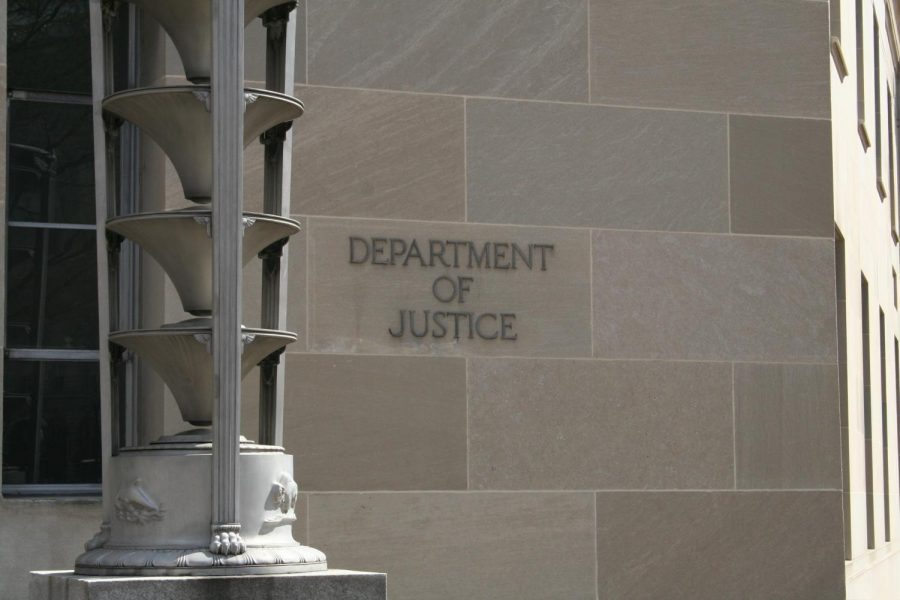Column: Texas’ new abortion law is unconstitutional
“Department of Justice” by skpy is licensed under CC BY-SA 2.0
The recent Texas abortion law is unconstitutional and violates the rights of many Texans.
September 25, 2021
A few weeks after Texas passed an abortion bill that outlawed abortion after six weeks of pregnancy, the Department of Justice, or DOJ, is attempting to sue the state over what is believed to be an unjust bill. The Biden administration asked for a preliminary injunction, which would block the enforcement of the state’s new law, while the lawsuit pans out in federal court.
This law forbids abortions after six weeks and encourages Texans to sue those who helped someone get an abortion for at least $10,000. The DOJ’s lawsuit would stop this from happening. However, the conservative wing of the U.S. Supreme Court allowed the anti-abortion bill to continue being Texan law in a 5-4 vote. In response, House Speaker Nancy Pelosi acted swiftly to schedule action on an abortion bill meant to protect women’s rights. Thankfully, the bill was successfully passed Sept. 24 by the U.S. House of Representatives.
The passing of the Texas law as well as the dismissal of its proposed ban by the Supreme Court were grave mistakes. Texas’ new law is “clearly unconstitutional under long-standing Supreme Court precedent….This kind of scheme to nullify the Constitution of the United States is one that all Americans, whatever their politics or party, should fear,” Attorney General Merrick Garland said about Senate Bill 8, or SB8, which is the anti-abortion law in question.
Essentially, SB8 overrides Roe v. Wade — a landmark 1973 federal decision legalizing pre-viability abortion throughout the country — since six weeks is clearly too early for a fetus to survive outside the womb. In this instance, Texas law is superseding federal law, which is in direct opposition to the Supremacy Clause in Article VI of the Constitution, ultimately rendering the anti-abortion law unconstitutional in itself.
I also believe SB8 violates the Fourteenth Amendment, which prohibits states from making laws that infringe upon the personal autonomy of Americans, a right that is protected by the first 13 amendments. This is exactly what the state of Texas has done to its female, non-binary and transgender residents who can have abortions. They no longer have autonomy over their own bodies to make the decision of whether or not to have a child after only six weeks of pregnancy. This infringement is an extreme violation of basic human rights.
As such, I wholeheartedly agree with the DOJ’s decision to take legal action against Texas. Six weeks is not a long enough window to prohibit abortions for a number of reasons, including the fact that an individual might not even be aware they are pregnant by this time.
Although supporters of the law might claim it is only to preserve life, as claimed by Texas Governor Greg Abbott, I would beg to differ and say that the lives of people already living on this earth are being affected more from this legislation. I’d also argue it is a deeper-rooted issue than just preserving and fighting for the right to life, and it goes beyond being a ‘conservative versus liberal’ issue. It is ultimately the rights of women versus the state, considering how short of a time frame the former are given to make a life-altering decision.
As students at Northeastern, it is important to be aware of this type of news because this law does not only affect people in Texas. The passing of this law is a rude awakening to the possibility of other states implementing similar legislation, cracking down on reproductive rights even harder than before. This is a direct attack on the status of reproductive rights in this country. As such, Northeastern students should be advocates of reproductive rights and encourage others to educate themselves on these ongoing events.
Alyssa Endres is a third-year political science and communication studies double major. She can be reached at endres.a@northeastern.edu.
Disclaimer: This previously stated that the Texas law allows private citizens to sue those who get abortions. In actuality, it empowers private citizens to sue those who help people get abortions. This article has been updated at 10:02 a.m. on Sept. 28 to rectify this error.







